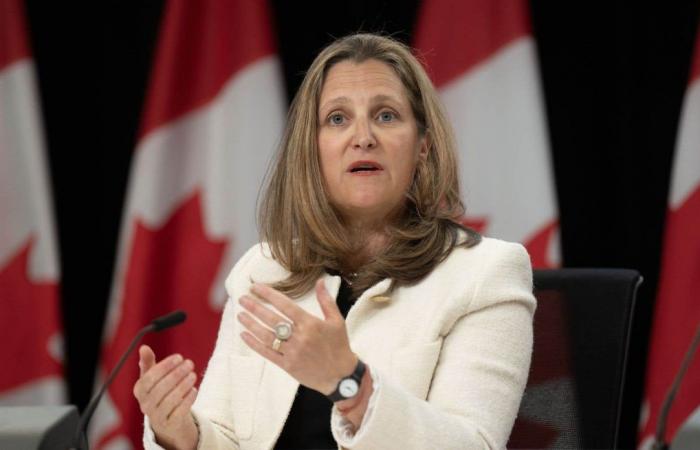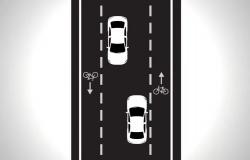Federal Finance Minister Chrystia Freeland is expected to announce a plan for potential tariffs Monday morning aimed at protecting Canada’s electric vehicle supply chain from unfair competition from China.
Mme Freeland and International Trade Minister Mary Ng will make a joint announcement in Ontario following moves this spring by the United States and Europe to increase import duties on electric vehicles made in China.
Before Canada can impose new tariffs, an anti-subsidy investigation must be conducted by the Canadian International Trade Tribunal.
Currently, the only electric vehicles made in China imported into Canada are Teslas which are manufactured in Shanghai.
China, however, is a larger player in Canada when it comes to batteries and battery components for electric vehicles, sectors in which Canada has invested heavily over the past four years.
In 2021, almost 80% of all lithium-ion batteries for electric vehicles worldwide came from China. The International Energy Agency says nearly 60% of electric vehicles sold globally are now made in China.
American and European response
Accusations that China boosted its own electric vehicle industry through unfair subsidies led Europe and the United States to retaliate this spring.
US President Joe Biden announced in mid-May that he would increase tariffs on Chinese electric vehicles from 25% to 100% this year, although there is only one electric vehicle Chinese currently available in the United States.
Mr. Biden also announced increased tariffs on lithium-ion batteries and some other clean energy products, including solar cells.
The European Commission is still investigating China subsidies, but announced two weeks ago that it would impose provisional tariffs of between 17% and 38% on Chinese-made electric vehicles starting July 4 .
That plan could change, however, as Europe and China have agreed to begin negotiations on the issue over the weekend.
Chinese-made electric vehicles now represent 8% of the European market, compared to 1% in 2019. Europe argues that its preliminary findings confirmed that Chinese electric vehicles benefit from an “unfair subsidy”.
Many Chinese electric vehicles are significantly cheaper than similar models made in Europe.
Consultation period
Canada’s decision will depend on the consultation process. A government source, speaking on condition that he not be named because he was not authorized to speak publicly, told The Canadian Press that a brief consultation period usually takes place before imposing tariffs precise customs officials.
Prime Minister Justin Trudeau has repeatedly said since the American announcement that Canada is monitoring the situation very closely.
On June 12, the day the European Commission announced its interim tariffs, Minister Ng revealed in a press scrum that Canada was working on its own plan.
“We are working on it, and I have been very clear about it,” she said. This is a question that concerns us. »
Mme Ng added that she was already in contact with the Canadian industry on this issue.
Typically, the anti-subsidy investigation process begins with an industry complaint.
“We have invested deeply and massively in the electric vehicle supply chain,” she recalled.
Since 2020, Canada has attracted more than $46 billion in investment for 13 electric vehicle, battery and battery component manufacturing projects.
Ottawa and the provinces have jointly promised up to $53 billion in return, notably in the form of tax credits, production subsidies and capital investments.






